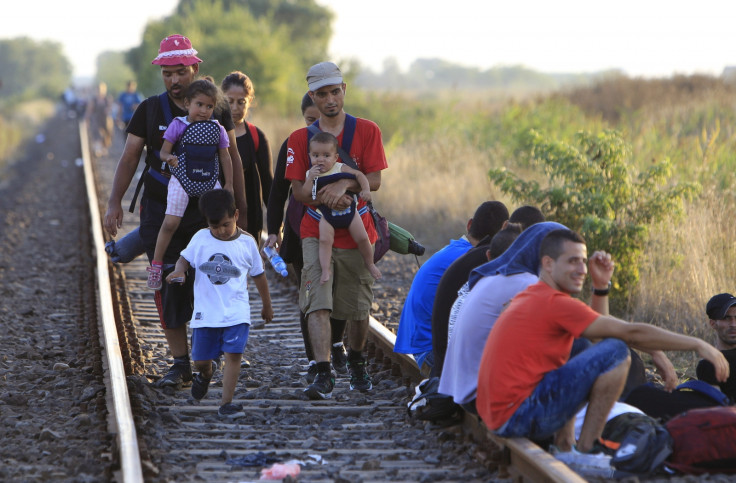Britain's failure to stop Syria's Assad has fuelled the Mediterranean migrant crisis

It is in Britain's tabloids where the debate surrounding the current refugee crisis is at its most bilious. The script is a familiar one: "Britain is full", there is a "swarm on our streets" and to set things right the government must "send in the army" – all recent tabloid headlines. There is some slight variation on the theme but the implied subtext is usually the same: keep the bloody foreigners out, at all costs.
As to actually halting the implacable wave of people trying to come to Britain, genuine solutions are thin on the ground. One even suspects that the lack of a proper resolution is part of the fun for those of a certain disposition – the more migrants there are coalescing in Calais the more vicarious pleasure can be drawn from calling for water cannons and live ammunition to be deployed against them.
The escalating refugee crisis is rightly blamed on the cruel indifference shown to the plight of the world's most vulnerable people by certain European governments, including our own
Perhaps more depressing is the inability of so many Britons to grasp that there are people in the world who might want something better than a dirt floor and a 100lb bomb dropped on their head. Refugees are not coming because Britain's "soft touch" welfare system is drawing them here like wasps to a jam jar; they are coming to Europe (for every Syrian refugee taken by the UK, Germany takes 27) in search of a decent and secure life that is free from poverty and war.
In other words, they are doing what politicians are usually quick to encourage us to do: they are striving for something better; they are being aspirational. The difference between a refugee and the member of the British middle classes is that for the former the stakes are often a matter of life and death.
A glance at where most current refugees are coming to Europe from ought to drive this point home. While those making the often perilous journey come from at least 40 countries, according to the United Nations Refugee Agency the majority come from countries plagued by war and dictatorship such as Syria, Libya, Eritrea and Mali.
But a draconian asylum policy is not the only thing that lies behind recent migration tragedies. Let us for a moment skip back two years to August 2013 and to the parliamentary vote on military action against Syrian dictator Bashar al Assad.
After that vote, in which the Labour party scotched planned military action against President Assad, former Labour leader Ed Miliband boasted of having stopped the "rush to war". For Miliband, this was widely portrayed as a stunning parliamentary success: Britain had "learned the lessons of Iraq" and, thanks to him, would not get "sucked into military conflict" in Syria.
And Britain did not get drawn into the military conflict in Syria; yet the bodies of Syrian civilians continued to pile up. So much for Labour "stopping the war".
Since September 2013 the Syrian government has violated United Nations Resolution 2118 (the framework for the elimination of Syrian chemical weapons) at least 87 times. Since the initial uprising against President Assad began in 2011, four million Syrians have now fled the country according to the UN, while almost eight million people have been internally displaced by violence.
The "root cause" of refugees fleeing Syria is not the capitalist system or Western imperialism, but the dictatorship which MPs voted to prolong in 2013. We hear an awful lot about the brutality of Islamic State (Isis) in the news, but it is worth remembering that the Syrian government has killed about seven times more Syrian civilians than IS.
This is not a view that will hold much sway with Labour's likely next leader Jeremy Corbyn. Corbyn's misleadingly named Stop the War Coalition believes that "the job of any anti-war movement is to oppose its own government's role [emphasis mine] in these wars". In other words, a foreign government may bomb and shoot its own people but should the West seek to defend the latter (or give them rifles with which to defend themselves) Stop the War will inevitably take to the streets and demand that Britain "stays out".
"Ah, but look at the mess in Libya and Iraq, that was the fault of the west," I can hear you counter. Perhaps, but dictatorships very often implode all by themselves, as is being aptly demonstrated in Syria. And besides, "stability" on its own is overrated, unless one adopts the colonialist attitude that "Saddam Hussein and Colonel Gaddafi may have been brutal dictators, but for those tribes he was good enough".
The escalating refugee crisis is rightly blamed on the cruel indifference shown to the plight of the world's most vulnerable people by certain European governments, including our own. But let us remember how many of those who are today mawkishly lamenting the sight of dead children were whooping and hollering in 2013 when parliament voted to appease the brutal dictator from whom some of these unfortunate souls are fleeing.
At the risk of stating the obvious, actions have consequences, and one consequence of building up Fortress Europe is regular television images of dead human beings lolling about in seawater.
But that is also a consequence of the fashionable one-eyed pacifism of Jeremy Corbyn's Stop the War Coalition, whereby mass murder is tolerated in far-away lands so long as someone else drops the bombs and the British army remains safely in its barracks.
It isn't possible to stop the world and get off; but nor is it possible to stop a war – and its predictable human cost - by closing one's eyes to it. We are all internationalists now, even if Nigel Farage and Jeremy Corbyn would like to pretend otherwise.
© Copyright IBTimes 2025. All rights reserved.






















